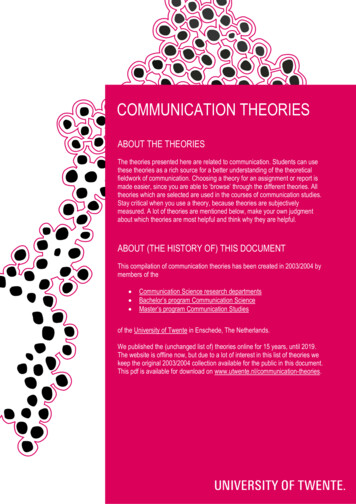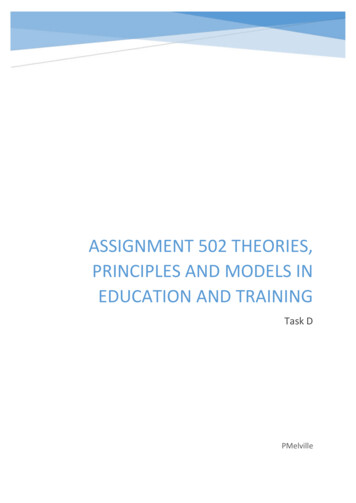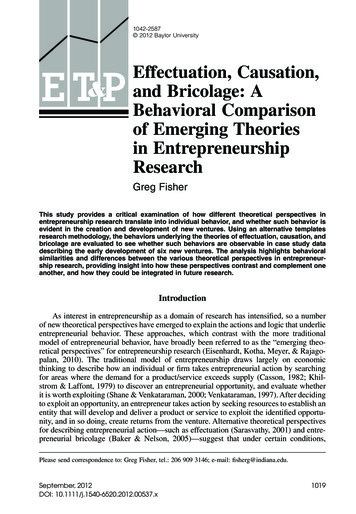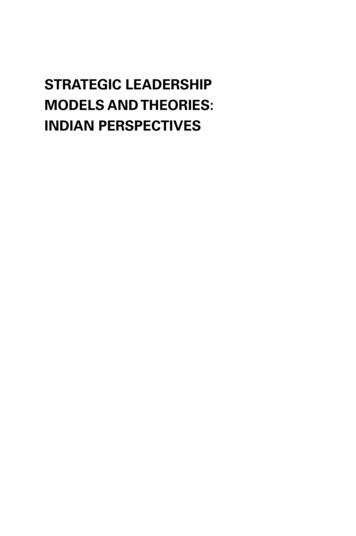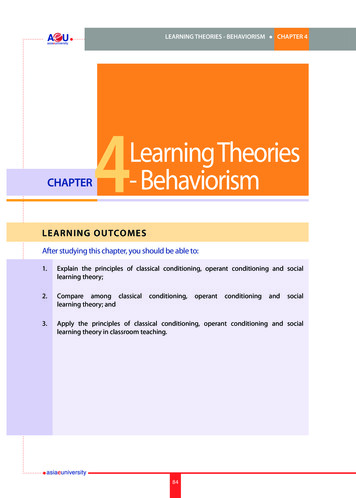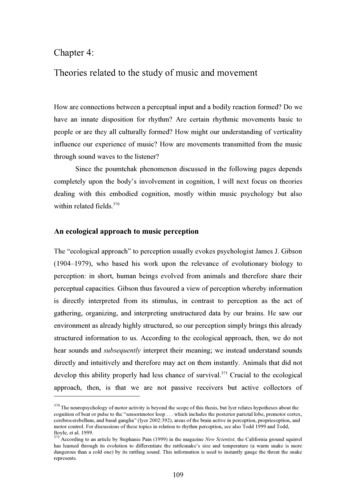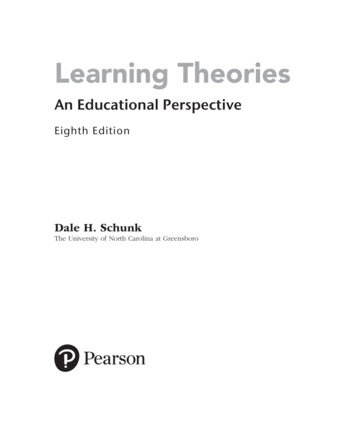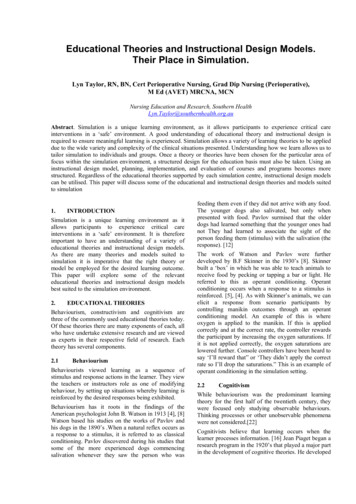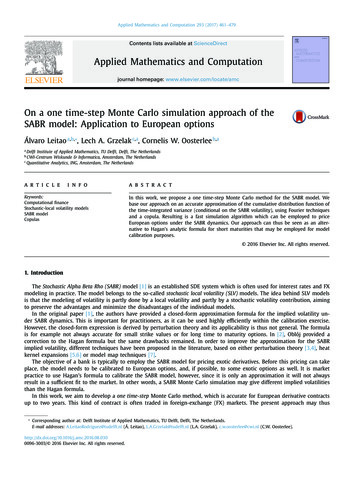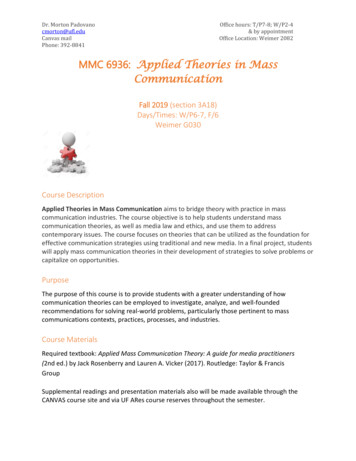
Transcription
Dr. Morton Padovanocmorton@ufl.eduCanvas mailPhone: 392-8841Office hours: T/P7-8; W/P2-4& by appointmentOffice Location: Weimer 2082MMC 6936: Applied Theories in MassCommunicationFall 2019 (section 3A18)Days/Times: W/P6-7, F/6Weimer G030Course DescriptionApplied Theories in Mass Communication aims to bridge theory with practice in masscommunication industries. The course objective is to help students understand masscommunication theories, as well as media law and ethics, and use them to addresscontemporary issues. The course focuses on theories that can be utilized as the foundation foreffective communication strategies using traditional and new media. In a final project, studentswill apply mass communication theories in their development of strategies to solve problems orcapitalize on opportunities.PurposeThe purpose of this course is to provide students with a greater understanding of howcommunication theories can be employed to investigate, analyze, and well-foundedrecommendations for solving real-world problems, particularly those pertinent to masscommunications contexts, practices, processes, and industries.Course MaterialsRequired textbook: Applied Mass Communication Theory: A guide for media practitioners(2nd ed.) by Jack Rosenberry and Lauren A. Vicker (2017). Routledge: Taylor & FrancisGroupSupplemental readings and presentation materials also will be made available through theCANVAS course site and via UF ARes course reserves throughout the semester.
Dr. Morton Padovanocmorton@ufl.eduCanvas mailPhone: 392-8841Office hours: T/P7-8; W/P2-4& by appointmentOffice Location: Weimer 2082Learning ObjectivesBy the end of the course, students will nurture a repertoire of tools that lay a foundation for theskills to:1. Identify, explain, and critique major paradigms, theories, and conceptual frameworksfor that have shaped the field of mass communications2. Demonstrate an appreciation for the ethical and social responsibility considerations forthose engaged in the mass communications professions3. Interpret, critique, and evaluate the published research of others as a step to developone's research hypotheses.4. Articulate in-depth understanding of conceptual foundations presented in scholarlywriting and oral communication5. Design and facilitate applied communication activities (i.e., presentations, groupsdiscussions, interpersonal exchange) in professional contexts utilizing the conceptualfoundations relevant to mass communications research.
Dr. Morton Padovanocmorton@ufl.eduCanvas mailPhone: 392-8841Office hours: T/P7-8; W/P2-4& by appointmentOffice Location: Weimer 2082AssessmentsAssessments provide opportunities for the instructor to get a sense of how well studentscomprehend and/or synthesize the course content. Assessments are not meant to be “make orbreak” events, but rather to be a point of knowledge communication and evaluation betweenstudents and the instructor. Course assessments are reviewed as follows: Interactive participation/discussion leader/presentation leader (20%): The quality of one’sexperience in this course — and the general success of the class objectives —will be largelyattributed to his or her level of involvement in the learning process. This category ofassessments provides opportunities for students to be an active participant in the review oftopics introduced in course readings. It is the responsibility of every individual in the class isto come having read the weekly assignments and prepared to discuss (even debate) thematerial. In the first week of the semester, the instructor will introduce a procedure thatwill guide the conversations. Otherwise, every student will have an opportunity to lead thediscussion at some point during the semester. Written Assignments (80%) - Regular written assignments will be issued to help studentscrystallize their judgments on the content that will be examined over the semester. Thegeneral nature of the written assignments and the weight apportioned to the final grade areas follows:o Topic proposal paper (10%): Provide a one-page summary of a question or topic thatwill define your interest for future research. In keeping with some to the textbookchapters and research introduced in class, your proposal should strive to explain theissue of interest, its relevance to mass communication, and why you believe it is animportant topic for exploration. At this stage, you are not required to identify aparticular theory to frame your topic. Therefore, the lion's share of your energy
Dr. Morton Padovanocmorton@ufl.eduCanvas mailPhone: 392-8841Office hours: T/P7-8; W/P2-4& by appointmentOffice Location: Weimer 2082should be allocated to what would otherwise serve as "an introduction to yourtopic."o Applied theory research - reaction papers (2 @ 10% each): Reaction papers are shortessays that offer your major reactions, questions, and critiques to the assignedreadings for a given theory. Students are encouraged to provide a well-reasonedanalysis of the body of work reviewed to demonstrate his/her understanding of thetheme of the week's readings. The point is not to summarize the readings in thereaction paper, but rather to use the perspectives offered in the reading materials asa foundation for comparing, contrasting, and discussing the strengths andweaknesses of the perspectives advanced in the readings. The paper will serve asthe basis of your contribution to the class discussion for the week.o Annotated bibliography paper (20%): The annotated bibliography assignment shoulddirectly relate to the topic of your theory paper. Its purpose is to provide afoundation on which you can build your research interest and represents a synopsisof the key research literature related to the theory you choose to explore in greaterdetail. The annotated bibliography is an individual assignment. It should include fullcitations from no less than 20 relevant sources, a short summation of the pointsraised by each source author, and a "key quote" that aides you in remembering thesignificance of the work. Each annotated bibliography citation should be singlespaced by source.o Applied Theory in mass communications proposal paper (30%): The culmination ofyour work to understand your topic within the framework of a mass communicationtheory will be reflected in the applied theory in mass communications proposal. Thisassignment requires you to integrate your findings from the literature review onyour theory (from the annotated bibliography assignment) with a practicalsecondary review of your selected topic (i.e., topic proposal paper). The proposal is
Dr. Morton Padovanocmorton@ufl.eduCanvas mailPhone: 392-8841Office hours: T/P7-8; W/P2-4& by appointmentOffice Location: Weimer 208210-15 pages in length and should conclude with propositions or hypotheses forresearch.Course Administrative PoliciesAcademic HonestyAcademic dishonesty is an important issue of concern at the University of Florida.Students who violate University rules on scholastic integrity are subject to disciplinarypenalties, including the possibility of failure in the course and dismissal from the University.Since dishonesty harms the individual, other students, and the integrity of the University,policies on scholastic dishonesty will be strictly enforced. On all work submitted for credit bystudents at the University of Florida, the following pledge is implied:“On my honor, I have neither given nor received unauthorized aid in doing thisassignment.”AttendanceThis skills-based, professional training course meets twice a week and is founded onstudent engagement and hands-on work. Much can be missed if an individual is absent.Although emergencies, illness (self or dependent others), and unforeseen circumstances cannot be anticipated in advance, I do encourage students to do all necessary to commit toreliable, on-time attendance every week. Students should be cautioned that his/her record ofattendance has a direct impact on his/her understanding of the course materials, and excessiveunexcused absence will affect your final grade.Each student is allowed two “free” missed classes on non-exam days without penalty tothe final attendance point total. Keep in mind that the free absences do not automaticallyexcuse the student from assignment due dates, point awarded for in-class participation, orother point-based activities. Routine unexcused absences over the two-missed-class minimumwill result in a loss of one-half point per absence and may directly affect the student’s grade.This does not apply, however, to excused absences due to activities sponsored by the College orendorsed CJC organizations or that require student participation in official University business.Class Format and ProtocolClass periods are meant to be interactive. I aspire for students to gain confidenceenough to make their points with professionalism and conviction, yet to not be so thoroughlyentrenched in “right-fighting” that they are not willing to be coached on alternative approachesto thinking through the problem-solving process.
Dr. Morton Padovanocmorton@ufl.eduCanvas mailPhone: 392-8841Office hours: T/P7-8; W/P2-4& by appointmentOffice Location: Weimer 2082For the two-period lecture block, the class will have a short break about halfwaythrough the discussion. Attendance, if taken, will generally occur in the second half of class.Contacting the InstructorI am committed to helping you grow as a future professional and will make myselfavailable for individual or group consultation as necessary to do so. At the top of thisdocument, please note the various ways you may use to contact me – by phone, answeringmachine, email, Canvas chat, or pre-scheduled Zoom meeting. In the case of Zoom, you areasked to send an email to set up a Zoom conference meeting in advance of the time you wantto interface. Once a time is agreed to, I will extend a Zoom invitation with the confirmed dateand time. Zoom is available to all UF students via https://ufl.zoom.us/ with a valid Gatorlinkusername and password.Written correspondence through Canvas mail is the most efficient means for contactingthe instructor. I will make every effort to reply to your email within 36 hours of you sending it.Please note that this period excludes weekends, holidays, or University-recognized breaks. Ifyou have sent an email message that is still awaiting a reply after 36 hours, please resend themessage. You may also verbally alert me during class time or call/come by during office hours.Personal Emergencies/ Excused AbsencesIt is the student’s responsibility to advise me of any personal emergency that couldaffect his/her attendance and/or participation in the course. In the case of personal emergencyor extenuating circumstance that results in you missing class over an extended period, pleasenotify me as soon as possible via e-mail at the earliest opportunity. The student will beresponsible for following up on any missed class discussion, notes, handouts, and/orannouncements made in his or her absence.Occasionally, a student’s participation in extracurricular organizations will require thats/he miss class to participate in organizationally sponsored events. Under such circumstancesand whenever possible, students are required to provide the instructor with appropriatedocumentation from the sponsoring organization BEFORE the absence.Support for Students with DisabilitiesStudents requesting classroom accommodations must first register with the DisabilityResource Center (https://disability.ufl.edu) in the Dean of Students Office. The Dean ofStudents Office will provide documentation to the student who must then provide thisdocumentation to the Instructor when requesting an accommodation. Each of us is likely toface challenges that may adversely affect our class performance. I am willing to help. However,I can only help if you notify me before your performance is affected.
Dr. Morton Padovanocmorton@ufl.eduCanvas mailPhone: 392-8841Office hours: T/P7-8; W/P2-4& by appointmentOffice Location: Weimer 2082Your well-being is important to the University of Florida. The U Matter, We Careinitiative is committed to creating a culture of care on our campus by encouraging members ofour community to look out for one another and to reach out for help if a member of ourcommunity is in need. If you or a friend is in distress, please contact umatter@ufl.edu so thatthe U Matter, We Care Team can reach out to the student in distress. A nighttime andweekend crisis counselor is available by phone at 352-392-1575. The U Matter, We Care Teamcan help connect students to the many other helping resources available including, but notlimited to, Victim Advocates, Housing staff, and the Counseling and Wellness Center. Pleaseremember that asking for help is a sign of strength. In case of emergency, call 9-1-1.
Dr. Morton Padovanocmorton@ufl.eduCanvas mailPhone: 392-8841Office hours: T/P7-8; W/P2-4& by appointmentOffice Location: Weimer 2082Tentative Course ScheduleThe course outline is presented to you at the onset of the semester lays out broadtopics and the order of progression that will guide us. The instructor will advise the class inadvance should there be any need for timeline adjustment.WeekTextbook Chapter(s)Week 1 (8/19)The Six Hats – A model for a productive, in-depth discussionWeek 2 (8/26)Chapters 1: Theory and the Study of Communication; andWeek 3 (9/2)Chapter 2: Historical Developments in Mass Comm TheoryWeek 4 (9/9)Chapter 2 (cont.): Historical Developments in Mass Comm Theorysupplemental readingsWeek 5 (9/16)Chapter 3: The Individual Perspective of Mass Comm TheoryWeek 6 (9/23)Chapter 3 (cont.): Supplemental readings (Ares)/Guest speakersWeek 7 (9/30)Chapter 4: The Sociological Perspective(Homecoming Holiday week - *No Class on Friday)
Dr. Morton Padovanocmorton@ufl.eduCanvas mailPhone: 392-8841Office hours: T/P7-8; W/P2-4& by appointmentOffice Location: Weimer 2082Week 8 (10/7)Chapter 4 (cont.): Supplement
Applied Theories in Mass Communication aims to bridge theory with practice in mass communication industries. The course objective is to help students understand mass communication theories, as well as media law and ethics, and use them to address contemporary issues. The course focuses on theories that can be utilized as the foundation for effective communication strategies using traditional .

